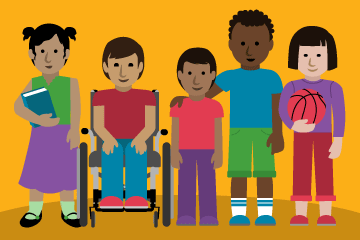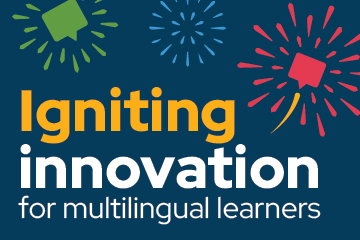Resources/Recursos
Featured Resources



All resources/Todos los recursos
Filter resources by:
Resources/Recursos
Using WIDA MODEL to support instructional planning for multilingual learners
In this Focus Bulletin, we aim to help readers better understand how WIDA MODEL test scores may be used to support instructional planning decisions for multilingual learners and their teachers. We describe the rich resources available from WIDA to help educators understand what the test scores mean. We also explain how these resources may be used, along with MODEL test scores to help inform where multilingual learners have opportunities to further develop their English language skills.
Published February 2022
Authors: Mark Chapman, Heather Elliott, Jennifer Feldmann
Released February 2020
WIDA Writing Rubric Grades 1-12
Use the WIDA Writing Rubric to understand the scores students earn on ACCESS for ELLs (Online and Paper), analyze student performance in the classroom, and plan ways to scaffold language learning.
Note: Do not use this rubric to score WIDA assessments. Find relevant scoring tools in the appropriate WIDA assessment training course.
Resource Details View Download NowReleased January 2020
WIDA Speaking Rubric Grades 1-12
Use the WIDA Speaking Rubric to understand the scores students earn on ACCESS for ELLs (Online and Paper), analyze student performance in the classroom, and plan ways to scaffold language learning.
Note: Do not use this rubric to score WIDA assessments. Find relevant scoring tools in the appropriate WIDA assessment training course.
Resource Details View Download NowReleased January 2020
Learning Language Every Day: Activities for Families (English)
Activities to start conversations with children about their family, what they like to play, how they feel, what sounds they hear in their home or community, and the weather.
Resource Details View Download NowReleased January 2020
Language and Culture
In February, 2011, WIDA published a Focus Bulletin on Language and Culture, which was enormously popular, and which continues to be requested by readers. This Focus Bulletin has been reformatted and lightly edited to emphasize current WIDA resources and terminology.
This Focus Bulletin explores linguistic and cultural diversity in school, and how teachers, staff and parents can help multilingual learners feel welcome, confident, and prepared to succeed academically.
Published September 2019
Authors: Don Bouchard, Mariana Castro, Andrea Cammilleri
Released December 2019
Oral Language in the Classroom
This Focus Bulletin explores the kind of spoken English language that multilingual learners benefit from developing, showing how that oral language is described in WIDA standards resources and assessed on the ACCESS for ELLs Speaking test.
Published October 2019
Authors: Mark Chapman, Dale Erlandson
Released November 2019
Using WIDA MODEL in International Contexts: Findings from the 2019 Educator Interviews
This working paper presents findings from a series of educator interviews conducted to understand how schools in the WIDA International School Consortium use MODEL.
Resource Details View Download NowReleased November 2019
Guiding Principles of Language Development (multiple languages)
These guiding principles of language development and learning exemplify WIDA’s overarching foundational beliefs and ever-present Can Do Philosophy. The guide includes research citations and defines WIDA's use of the term multilingual learner.
This guide, available in multiple languages, can be used as a resource for educators to share with parents and families.
Resource DetailsReleased September 2019
Supporting Multilingual Students with WIDA and International Baccalaureate Resources
This Focus Bulletin illustrates how educators in featured International Baccalaureate schools are integrating WIDA resources as they design lessons for multilingual learners.
Published June 2019
Authors: Jon Nordmeyer, Ruslana Westerlund, Elizabeth Cranley, Anne Katz
Released June 2019
WIDA School Improvement System
This flyer provides an overview of the WIDA School Improvement System – a school-wide assessment and feedback system that measures key instructional leadership practices.
Resource Details View Download NowReleased May 2019
Using WIDA MODEL in International Contexts: Findings from the 2018 Educator Survey
This working paper presents findings from a survey conducted in 2018 to understand how schools in the WIDA International School Consortium use MODEL.
Published 2019
Resource Details View Download NowReleased May 2019
Less Than Four Domains: Creating an Overall Composite Score as an Indicator of English Language Proficiency for English Learners with 504 or Individualized Education Plans
The illustrated models and procedures can be applied to calculate overall composite scores to identify an indicator of English language proficiency, based on composite scores for English learners with 504 or individualized education plans who are missing one or more domain scores on the Assessing Comprehension and Communication in English State-to-State for English Language Learners assessment for state monitoring, achievement and accountability determinations.
Resource DetailsReleased May 2019
Language-Focused Family Engagement
This WIDA Focus Bulletin introduces readers to the four pillars of Language-Focused Family Engagement and provides tools to help educators examine their local family engagement practices.
Published September 2018
Author: Delis Cuéllar, Alissa Blair, Lorena Mancilla
Released April 2019
Language-Focused Planning Tool
How can PreK educators get started planning equitable learning opportunities for multilingual children? Use this language-focused planning tool to embed a language-focused approach to your planning.
Resource Details View Download NowReleased April 2019
Less Than Four Domains: Creating an Overall Composite Score for English Learners with Individualized Education Plans
The analysis in this report illustrates models and procedures that can be used to assign a missing domain score in order to calculate an overall composite score. These methods only apply to assessments taken by English learners whose IEPs or 504 plans require they not be tested in one or more domains.
Resource Details View Download NowReleased March 2019
Investigating K-12 English Learners' Use of Universal Tools Embedded in Online Language Assessments
This study examined how English learners in Grades 1-12, with and without disabilities, used online accessibility features during an ELP assessment. These accessibility features are designed to provide the necessary support for the general EL population, including ELs with disabilities.
Published March 2019
Authors: Ahyoung Alicia Kim, Meltem Yumsek, Mark Chapman, H. Gary Cook
Released March 2019
ABCs of Family Engagement
This guide presents six key considerations for strengthening family engagement practices and building relationships with families.
Resource Details View Download NowReleased February 2019
Long-term English Learners across 15 WIDA States
This research brief presents findings and policy implications from a recent research study exploring the so-called long-term English learner (LTEL) population across WIDA states. The findings highlight a continuing need for research that rejects an overly simplistic understanding of the LTEL designation. The next phase of this research will use student- and school-level data from three states to examine how individual and school factors can affect the diverse trajectories of ELs’ language development over time.
Published January 2019
Resource Details View Download NowReleased January 2019
Understanding Language Proficiency to Develop Language Goals, Grades 6-12
These lesson plans (with accompanying worksheets) guide grades 6-12 students in understanding language proficiency, determining their own strengths, and setting goals for language development.
Resource Details View Download NowReleased December 2018
Understanding Language Proficiency to Develop Language Goals, Grades K-5
These lesson plans (with accompanying worksheets) guide grades K-5 students in understanding language proficiency, determining their own strengths, and setting goals for language development.
Resource Details View Download NowReleased December 2018




